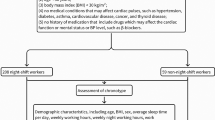Abstract
Shift Work contribute to dysregulation of the typical sleep and awake periods that cause circadian distortions, increasing the risk of cardiovascular mortality and morbidity and developing metabolic diseases. Firefighting is a career that demands much of individuals and has a great impact on their health, making it a high-risk job. Objectives: This study aims to characterize shift workers’ blood pressure profiles in an attempt to understand the repercussions of shift work on the circadian blood pressure rhythm in a sample of professional firefighters. Materials and methods: Participants were classified based on their dipping status: dipper drop of 10–20%; non-dipper 0–10%; invert-dipper when there is a rise in BP; extreme-dipper superior to 20%. Results: Abnormal dipping was found in 55.6% of the participants, and there was a marked difference in gender in percentage where dipping is concerned, with 66.7% of women having abnormal dipping against 50% of the men. It was proved that men had a slower heart rate than women (p-value = 0.029) and that dippers had a higher 24 h DBP compared with those of abnormal dipping (p-value = 0.049). Conclusions: Shift work is a high-risk module of labor, and its consequences require a more thorough examination. Abnormal dip- ping prevailed in firefighters, and the differences between genders need to be better characterized in future studies.
Access this chapter
Tax calculation will be finalised at checkout
Purchases are for personal use only
Similar content being viewed by others
References
Araújo, S., Rouxinol-Dias, A., Mesquita-Bastos, J., Silva, J., Barbosa, L., Polónia, J.: Ambulatory blood pressure monitoring profiles in a cross-sectional analysis of a large database of normotensive and true or suspected hypertensive patients. Rev. Port. Cardiol. (Engl Ed). 37(4), 319–327 (2018)
Fialho, G., Cavichio, L., Povoa, R., Pimenta, J.: Effects of 24 h shift work in the emergency room on ambulatory blood pressure monitoring values of medical residents. Am. J. Hypertens 19(10), 1005–1009 (2006)
Ganesan, S., Magee, M., Stone, J.E., et al.: The Impact of shift work on sleep, alertness and performance in healthcare workers. Sci. Rep. 9(1), 4635. Published 2019 Mar 15.
Hamta, A., Kazemnejad, A., Gholami-Fesharaki, M., Rowzati, M.: Simultaneous effect of shift work on blood pressure and lipid profile: a path analysis. Int. J. Occup. Saf. Ergon. 24(1), 68–72 (2018)
Hermida, R.C., Ayala, D.E., Mojón, A., Fernández, J.R.: Blunted sleep-time relative blood pressure decline increases cardiovascular risk independent of blood pressure level–the “normotensive non-dipper” paradox. Chronobiol. Int. 30(1–2), 87–98 (2013)
Jagannath, A., Taylor, L., Wakaf, Z., Vasudevan, S.R., Foster, R.G.: The genetics of circadian rhythms, sleep and health. Hum. Mol. Genet. 26(R2), R128–R138 (2017)
Kecklund, G., Axelsson, J.: Health consequences of shift work and insufficient sleep. BMJ 355, i5210. Published 2016 Nov 1. https://doi.org/10.1136/bmj.i5210
Kitada, R., Iwata, S., Hanatani, A., et al.: Effects of night shift work on nighttime blood pressure among healthy young female medical workers. Osaka City Med. J. 62(2), 39–46 (2016)
Kwon, Y., Stafford, P.L., Lim, D.C., et al.: Blood pressure monitoring in sleep: time to wake up. Blood Press. Monit. 25(2), 61–68 (2020)
Lo, S.H., Liau, C.S., Hwang, J.S., Wang, J.D.: Dynamic blood pressure changes and recovery under dif- ferent work shifts in young women. Am. J. Hypertens 21(7), 759–764 (2008)
Lunde, L.K., Skare, Ø., Mamen, A., et al.: Cardiovascular health effects of shift work with long working hours and night shifts: study protocol for a three-year prospective follow-up study on industrial workers. Int. J. Environ. Res. Public Health 17(2), 589. Published 2020 Jan 16
Morris, C.J., Purvis, T.E., Mistretta, J., Hu, K., Scheer, F.A.J.L.: Circadian misalignment increases C-Reactive protein and blood pressure in chronic shift workers. J. Biol. Rhythms 32(2), 154–164 (2017)
Nascimento, J.O.V., Santos, J.D., Meira, K.C., Pierin, A.M.G., Souza-Talarico, J.N.: Shift work of nursing professionals and blood pressure, burnout and common mental disorders. Rev. Esc. Enferm. USP. 53, e03443. Published 2019 May 30
O’Brien, E., White, W.B., Parati, G., Dolan, E.: Ambulatory blood pressure monitoring in the 21st century. J. Clin. Hypertens (Greenwich) 20(7), 1108–1111 (2018)
Patterson, P.D., Mountz, K.A., Budd, C.T., et al.: Impact of shift work on blood pressure among emergency medical services clinicians and related shift workers: a systematic review and meta-analysis. Sleep Health 6(3), 387–398 (2020)
Reid, K.J.: Assessment of circadian rhythms. Neurol. Clin. 37(3), 505–526 (2019)
Smolensky, M.H., Hermida, R.C., Portaluppi, F.: Circadian mechanisms of 24 h blood pressure regulation and patterning. Sleep Med. Rev. 33, 4–16 (2017)
Su, T.C., Lin, L.Y., Baker, D., et al.: Elevated blood pressure, decreased heart rate variability and incomplete blood pressure recovery after a 12 h night shift work. J. Occup. Health 50(5), 380–386 (2008)
Tang, K.S., Medeiros, E.D., Shah, A.D.: Wide pulse pressure: a clinical review. J. Clin. Hypertens (Greenwich) 22(11), 1960–1967 (2020). https://doi.org/10.1111/jch.14051
Watkins, E.R., Walker, A., Mol, E., Jahnke, S., Richardson, A.J.: Women firefighters’ health and well-being: an international Survey. Womens Health Issues 29(5), 424–431 (2019)
Yamasaki, F., Schwartz, J.E., Gerber, L.M., Warren, K., Pickering, T.G.: Impact of shift work and race/ethnicity on the diurnal rhythm of blood pressure and catecholamines. Hypertension 32(3), 417–423 (1998)
Author information
Authors and Affiliations
Corresponding author
Editor information
Editors and Affiliations
Rights and permissions
Copyright information
© 2024 The Author(s), under exclusive license to Springer Nature Switzerland AG
About this chapter
Cite this chapter
Duarte, I.F., Pereira, J., Lima, J.P.M., Simões, H., Pereira, T., Conde, J. (2024). Circadian and Biological Rhythms in Shift Workers—A Firefighter’s Study. In: Arezes, P.M., et al. Occupational and Environmental Safety and Health V. Studies in Systems, Decision and Control, vol 492. Springer, Cham. https://doi.org/10.1007/978-3-031-38277-2_18
Download citation
DOI: https://doi.org/10.1007/978-3-031-38277-2_18
Published:
Publisher Name: Springer, Cham
Print ISBN: 978-3-031-38276-5
Online ISBN: 978-3-031-38277-2
eBook Packages: EngineeringEngineering (R0)




